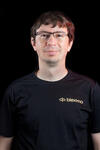Konstantin Nesterov
We study electron interactions in a nanosized chaotic metallic grain with a large Thouless conductance. We use the so-called universal Hamiltonian, which describes the low-energy physics of such a grain. The noninteracting part of this model fluctuates and is described by random-matrix theory, while its interaction terms are universal and do not fluctuate. Of particular interest are grains in the fluctuation-dominated regime of pairing correlations, where the grain is so small that its single-particle mean level spacing is comparable to or larger than the bulk pairing gap.
We first study the heat capacity and spin susceptibility of a grain in the absence of spin-orbit scattering. The universal Hamiltonian of such a grain describes the competition between pairing and exchange correlations. We study this competition in odd-even particle-number effects in the thermodynamic observables and investigate the mesoscopic fluctuations of these observables. We find that odd-even effects can be suppressed and shifted to lower temperatures by the exchange interaction. In the fluctuation-dominated regime, mesoscopic fluctuations can wash out these effects completely, and the fluctuations of the spin susceptibility may be especially large.
In a second study, we focus on the magnetic-field response of the discrete energy levels in a grain with strong spin-orbit scattering. In this case, the only nontrivial interaction term in the universal Hamiltonian is the pairing interaction. We show that the linear part of the response, parametrized by g-factors, is independent of the strength of the pairing interaction. On the other hand, the quadratic part, parametrized by the level curvatures, is sensitive to pairing correlations and can be used to probe them.
